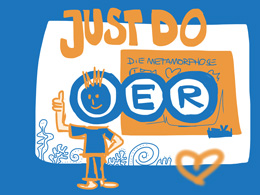
 Der MOOC „Gesellschaftliche Aspekte der Informationstechnologie“ auf iMooX geht nun in die siebte Woche. Diesesmal sind die Expertin Margarete Grimus und der Experte Michael Kopp an der Reihe. Die Themen? Mobile Learning und MOOC. Ich denke spannend genug um mitzumachen.
Der MOOC „Gesellschaftliche Aspekte der Informationstechnologie“ auf iMooX geht nun in die siebte Woche. Diesesmal sind die Expertin Margarete Grimus und der Experte Michael Kopp an der Reihe. Die Themen? Mobile Learning und MOOC. Ich denke spannend genug um mitzumachen.
Also unbedingt vorbei schauen und mitdiskutieren – der Einstieg in den MOOC ist jederzeit noch möglich.
[Link zum Kurs]
[imoox] Online-Kurs zu Open Educational Resources #coer15 #imoox
 Es freut mich sehr, dass ich den Kurs „Online-Kurs zu Open Educational Resources“ ankündigen kann. Das hat natürlich auch den Grund, dass unser allererster MOOC – COER13 – ein derart erfolgreicher war. Im Frühjahr 2013 haben wir diesen cMOOC durchgeführt und er ist heute noch hier online. Nun haben wir Teile davon auf die Plattform iMooX übertragen, teilweise erweitert und in einen xMOOC umgewandelt. Damit hoffen wir, dass für uns so wesentliche Thema noch einem größeren Publikum zugänglich zu machen.
Es freut mich sehr, dass ich den Kurs „Online-Kurs zu Open Educational Resources“ ankündigen kann. Das hat natürlich auch den Grund, dass unser allererster MOOC – COER13 – ein derart erfolgreicher war. Im Frühjahr 2013 haben wir diesen cMOOC durchgeführt und er ist heute noch hier online. Nun haben wir Teile davon auf die Plattform iMooX übertragen, teilweise erweitert und in einen xMOOC umgewandelt. Damit hoffen wir, dass für uns so wesentliche Thema noch einem größeren Publikum zugänglich zu machen.
Also am 11.5 geht es los und ich freue mich zusammen mit meinen Partner über viele Teilnehmerinnen und Teilnehmer. Also, gleich hier anmelden 🙂 .
[publication] Eine Vorlesung lädt zur Online Diskussion: Der GADI MOOC #imoox
Für das neue OCG Journal habe ich einen kurzen Artikel über die Lehrveranstaltung „Gesellschaftliche Aspekte der Informationstechnologie (GADI)“ geschrieben. Selbstverständlich hab ich dabei die Durchführung als MOOC auf iMooX erwähnt:
Referenz: Ebner, M. (2015) Eine Vorlesung lädt zur Online Diskussion: Der GADI MOOC, OCG Journal 2015 (1), S. 14
[imoox, gadi] Woche 6: Sichere Kommunikation und Green IT

![[GADI15] Chip Maguire](https://elearningblog.tugraz.at/wp-content/uploads/2013/03/Bildschirmfoto-2013-03-04-um-22.15.17.png) Der MOOC „Gesellschaftliche Aspekte der Informationstechnologie“ auf iMooX geht nun schon in die fünfte Woche. Diesesmal sind die Experten Chip Maguire und Rüdiger Wetzl die uns in ihren Fachbereichen Einblicke geben werden. Beiden Themen, jenes der sicheren digitalen Kommunikation und Green IT, gehen uns alle an und wir sind eigentlich unmittelbar davon betroffen.
Der MOOC „Gesellschaftliche Aspekte der Informationstechnologie“ auf iMooX geht nun schon in die fünfte Woche. Diesesmal sind die Experten Chip Maguire und Rüdiger Wetzl die uns in ihren Fachbereichen Einblicke geben werden. Beiden Themen, jenes der sicheren digitalen Kommunikation und Green IT, gehen uns alle an und wir sind eigentlich unmittelbar davon betroffen.
Also unbedingt vorbei schauen und mitdiskutieren – der Einstieg in den MOOC ist ebenso jederzeit möglich.
[Link zum Kurs]
[imoox] Start „Aha-Erlebnisse der Experimentalphysik“ – Teil 2 #imoox
 Diese Woche startet die Einführungswoche für den MOOC „AHA-Erlebnisse der Experimentalphysik – Teil 2„. Wiederum haben wir spannende physikalische Experimente zusammengestellt, so werden Bleistifte z.B. durch Gispkartonplatten geschossen oder Fernsehgeräte implodiert. Anmelden zahlt sich also sicherlich aus.
Diese Woche startet die Einführungswoche für den MOOC „AHA-Erlebnisse der Experimentalphysik – Teil 2„. Wiederum haben wir spannende physikalische Experimente zusammengestellt, so werden Bleistifte z.B. durch Gispkartonplatten geschossen oder Fernsehgeräte implodiert. Anmelden zahlt sich also sicherlich aus.
Der Kurs selbst ist der zweite Teil des bereits vor einem Jahr angebotenen MOOC, also quasi eine Fortsetzung.
[imoox, gadi] Woche 4: Virtuelle Welten und Big Data #gadi15 #imoox

 Der MOOC „Gesellschaftliche Aspekte der Informationstechnologie“ auf iMooX geht schon in die vierte Woche. Diesesmal sind die Experten Patrick Schweighofer und Martin Gersch bzw. Hannes Rothe die uns in ihren Fachbereichen Einblicke geben werden. Die Themen Virtuelle Welten und Geschäftsmodelle rund um Big Data beschäftigen uns bereits heute, aber werden wohl zukünftig noch viel wichtiger werden.
Der MOOC „Gesellschaftliche Aspekte der Informationstechnologie“ auf iMooX geht schon in die vierte Woche. Diesesmal sind die Experten Patrick Schweighofer und Martin Gersch bzw. Hannes Rothe die uns in ihren Fachbereichen Einblicke geben werden. Die Themen Virtuelle Welten und Geschäftsmodelle rund um Big Data beschäftigen uns bereits heute, aber werden wohl zukünftig noch viel wichtiger werden.
Also unbedingt vorbei schauen und mitdiskutieren – der Einstieg in den MOOC ist ebenso jederzeit möglich.
[Link zum Kurs]
[imoox, gadi] Dritte Woche: Copyright und Open Science #imoox #gadi15

 Der MOOC „Gesellschaftliche Aspekte der Informationstechnologie“ auf iMooX geht in die dritte Woche. Diesesmal sind die beiden Experten Peter Purgathofer und Andreas Neuhold die uns in ihren Fachbereichen Einblicke geben werden. Die Themen Copyright und Open Science beschäftigen uns insbesondere seit dem Aufkommen des Internets, aber wirklich bewegt hat sich seit dem auch noch nichts.
Der MOOC „Gesellschaftliche Aspekte der Informationstechnologie“ auf iMooX geht in die dritte Woche. Diesesmal sind die beiden Experten Peter Purgathofer und Andreas Neuhold die uns in ihren Fachbereichen Einblicke geben werden. Die Themen Copyright und Open Science beschäftigen uns insbesondere seit dem Aufkommen des Internets, aber wirklich bewegt hat sich seit dem auch noch nichts.
Also unbedingt vorbei schauen und mitdiskutieren – der Einstieg in den MOOC ist ebenso jederzeit möglich.
[Link zum Kurs]
[presentation] First experiences with iMooX – an austrian wide MOOC platform #imoox
My today’s presentation about „First experiences with iMooX – an austrian wide MOOC platform “ at the 3rd SIG meeting of Eduhub is also online available:
Klicken Sie auf den unteren Button, um den Inhalt von www.slideshare.net zu laden.
[imoox, gadi] Zweite Woche: Smartmachines und Wissensmanagment #imoox #gadi15

 Der MOOC „Gesellschaftliche Aspekte der Informationstechnologie“ auf iMooX geht in die zweite Woche. Diesesmal sind die beiden Experten Christian Kittl und Alexander Stocker die uns in ihren Fachbereichen Einblicke geben werden. Die Themen Smartmachines und Wissensmanagement sind durchaus brisant, vor allem was zukünftige Entwicklungen angeht.
Der MOOC „Gesellschaftliche Aspekte der Informationstechnologie“ auf iMooX geht in die zweite Woche. Diesesmal sind die beiden Experten Christian Kittl und Alexander Stocker die uns in ihren Fachbereichen Einblicke geben werden. Die Themen Smartmachines und Wissensmanagement sind durchaus brisant, vor allem was zukünftige Entwicklungen angeht.
Also unbedingt vorbei schauen und mitdiskutieren 🙂
[Link zum Kurs]
[imoox] Start „Gesellschaftliche Aspekte der Informationstechnologie“ #imoox #gadi15
Meine Lehrveranstaltung „Gesellschafliche Aspekte der Informationstechnologie“ die heuer erstmal als Massive Open Online Course (MOOC) durchgeführt hat, startet heute auf der Plattform iMooX. Neben meiner Einführung kommen diese Woche zwei weitere Experten zu Wort – Günter Schreier und Andreas Holzinger – und widmen sich dabei dem Problemfeld eHealth und Big Data in der Medizin.
Wer jetzt noch Lust verspürt mitzumachen – anmelden ist noch jederzeit möglich 🙂 .

